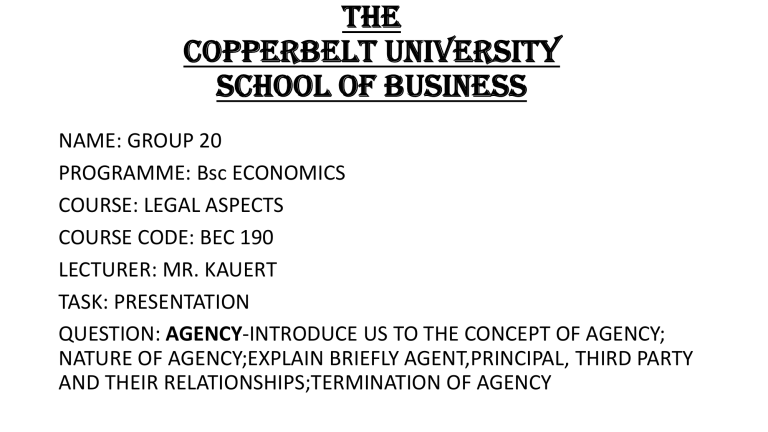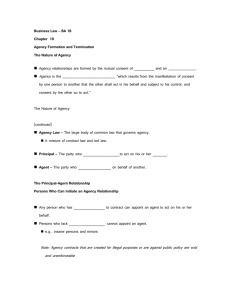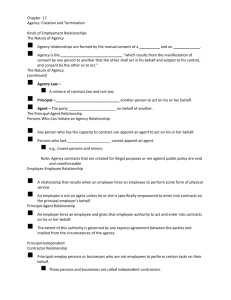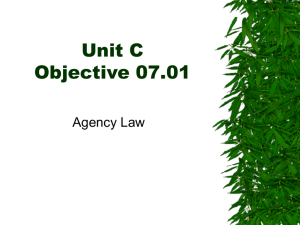Agency Law: Agent, Principal, & Third Party Relationships
advertisement

THE
COPPERBELT UNIVERSITY
SCHOOL OF BUSINESS
NAME: GROUP 20
PROGRAMME: Bsc ECONOMICS
COURSE: LEGAL ASPECTS
COURSE CODE: BEC 190
LECTURER: MR. KAUERT
TASK: PRESENTATION
QUESTION: AGENCY-INTRODUCE US TO THE CONCEPT OF AGENCY;
NATURE OF AGENCY;EXPLAIN BRIEFLY AGENT,PRINCIPAL, THIRD PARTY
AND THEIR RELATIONSHIPS;TERMINATION OF AGENCY
INTRODUCTION TO THE CONCEPT OF AGENCY
(1)
• This is a concept that concerns a legal relationship in which
an agent is legally authorized to act on behalf of a principal
to make legal relations with a third party .
• An agent is a person who is legally authorized by a principal
to create legal relations on his behalf (middleman).
• A principal is a person who legally engages a person or
people called agents to legally represent them.
• A third party is a person who enters in a legal relation with a
principal through an agent
INTRODUCTION TO THE CONCEPT OF AGENCY
(2)
• This topic involves:
• The creation of agency .
• The agent, the principal, the third party and their
relationships.
• The termination of agency.
CREATION OF AGENCY (1)
• Agency Is a relationship between the principal and an agent
in which the principal confer his rights on the agent to act on
the principals behalf. Such a relationship is based on an
agency contract.
• The rights and duties of the agent and principal are in
accordance with the express or implied terms of the contract
.
• The principal must intend that the agent acts for him or her.
• Agent must intend to accept the authority and act on it .
• The relationship of an agency depends on the will and by act
of the principal.
AUTHORITY (1)
• Actual authority (1)
• When an agent acts with actual authority ,he/she acts with
the principal’s definite permission.
• Express authority : This is actual authority based on the
principal’s oral or written statement to the agent.
• Implied authority : This is actual authority based on the
agents common sense fulfilment of the principal’s business.
AUTHORITY (2)
• Apparent authority (1)
• This is when a third party reasonably assumes that the
principal granted contractual authority to the agent.
• Note : Apparent authority can exist even when the principal
expressly directs the agent not to make contracts on his or
her behalf .
WAYS IN WHICH AN AGENCY CAN BE
CREATED(1)
• Express appointment
• By implication
• By ratification
• By necessity
• By estoppel
WAYS IN WHICH AN AGENCY CAN BE CREATED (2)
• EXPRESS APPOINTMENT(1)
• An agency is created by express appointment when the principal
appoints the agent by express agreement with the agent. This express
agreement may be oral or written agreement between the principal
and the agent.
• Contract law principal: applies to an agency agreement. For example:
an agent may agree to act in consideration for reward ,on the other
hand ,an agency is gratuitous if the agent agrees to act for no
consideration
WAYS IN WHICH AN AGENCY CAN BE CREATED (2)
• EXPRESS APPOINTMENT(2)
• General rule: agency can be created orally
• This rule also applies to the appointment of an agent for the
signing of agreements for sale and purchase of immovable
property ,on behalf of the purchaser.
• THE EXCEPTION TO THE RULE: an agent appointed to execute a
deed on behalf of the principal. Agent appointed by deed is
called power of attorney.
WAYS IN WHICH AN AGENCY CAN BE
CREATED (3)
• BY IMPLICATION
• Implication of agency arises where there is a pre-existing
agency relationship and it is assumed by the third party that
the principal has given authority to act as an agent in
matters not covered by the express appointment.
• This implied authority arises by the position held by the
agent.
• Example : The Copperbelt University secretary has implied
authority to enter into contract on behalf of the university
which is related to the day to day operation of work.
WAYS IN WHICH AN AGENCY CAN BE
CREATED (4)
• BY RATIFICATION
• Agency by ratification arises when a person (the principal)
ratifies an act which has already been done in his name ,on
his behalf by an agent who has no authority to act on the
principals behalf .
• Ratification must take place within a reasonable time.
WAYS BY WHICH AGENCY CAN BE CREATED(5)
•BY NECESSITY
• This type of agency arises where a person takes urgent
action on behalf of another in the event of an emergency.
There will be normally be some kind of pre-existing
contractual relationship between the parties.
•
BY ESTOPELL
• This arises where a person by his word of mouth or by
conduct has allowed to appear to outsiders to be his agent .
• The principal will be prevented (estopped) from later
denying that the person had authority to act as his agent.
TYPES OF AGENTS (1)
1. GENERAL AGENT :Has power to act in relation to particular
kinds of transactions, e.g Estate agent
2. SPECIAL AGENT: Limited to act in a specific transaction
3. MERCANTILE AGENT: Has authority binding by the principal
to buy or sell goods ,consign goods for sale or to raise
money by pledging goods (commissioner agent)
4. DEL CEDERE AGENT: Guarantees the principal in return for
extra commission that if the 3rd party fails to pay for goods
received, he/she will compensate the principal.
5. SUBAGENTS :To carry out his/her duties an agent will often
need to appoint her own agents . The appointments may
or may not be authorized by the principal.
THE RELATIONSHIP OF PRINCIPAL AND
AGENT(1)
THE DUTIES OF AGENT TO PRINCIPAL(1)
i.
To perform the agreed task according to the instructions of the of the
principal . A failure to which will leave the agent open to an action of
breach of contract.
ii. To carry out instructions personally: Unless expressly or implied
authorized to delegate the work ,an agent owes duty to the principal to
act personally in completion of the task.
iii. To account :There is an implied duty that the agent must keep proper
accounts of all transactions.
iv. Duty of care and skill: An agent will owe a duty to act with reasonable
care and skill , regardless whether the agency relationship is contractual
or gratuity
THE RELATIONSHIP OF PRINCIPAL AND
AGENT(2)
General equitable duties which flow from the fact that agency
relationship is fiduciary (related to trusts and trustees) on that
it is one based on trust are as follows:
i. Not to permit conflict of interest to arise : An agent must
not allow the possibility of personal interest to conflict
with the interest of his or her principal .
ii. Not to make a secret profit or misuse confidential
information: An agent should not use his her position as an
agent to secure financial advantage for him or herself
without full disclosure to his principal.
THE RELATIONSHIP OF PRINCIPAL TO AGENT
(3)
iii. Not to take a bribe: This is a duty that is closely related to the duty
of not making secret profit , but it is goes so much to the root of agency
relationship .
Where it is found that an agent has taken a bribe ,the following civil
remedies are open to the principal :
• To dismiss the agent without notice
• To claim the amount of the bribe
• To repudiate the contract with the third party
• Refuse to pay any money owed to the agent
• The payment of the bribe may also have constitute a breach of
criminal.
THE RIGHTS OF AN AGENT
• These are entitlements which an agent enjoys in a
relationship.
• To claim remuneration for service performed : it is usual in
agency agreements for the amount of payment to be stated
,either in form of wages or commission.
• To claim indemnity or protection against the principal for all
expenses legitimately incurred in the performance of
services .
• To exercise a lien over property owned by the principal: This
is the right to retain the principals goods, where they have
lawfully come into the agent’s possession and hold them
against any debts outstanding to him or her.
DUTIES OF PRINCIPAL TO AGENT(1)
CONTRACTUAL DUTIES
• Compensation
• Reimbursement
• Indemnification
COMPENSATION (1)
• A principle must compensate the agent as specified in
the contract, or for the reasonable value of services
provided if amount is not specified. The principal is
obligated to provide the agent with reasonable
compensation.
•Example: Default rules in a relationship with a sales
agent dictate that the agent will earn a reasonable
commission on sales induced or completed.
REIMBURSEMENT (1)
• The principal must pay back to the agent authorized
payments the agent has made on the principal’s
behalf. Reasonable reimbursement includes the cost
of travel,meals,lodging, incidental expenses e.t.c
• Example: If K tells Z to pay D k100. This payment is
expressly authorized by K and K must reimburse Z.
INDEMNIFICATION (1)
• The principal must pay back the agent for the losses the
agent incurred while acting as directed by the principal .
• EXAMPLE: If K hires Z to handle a social event and Z finds
it necessary to purchase certain suppliers for the event.
Even though K didn’t expressly authorize a particular
purchase, Z made it in fulfillment of his agency duties
.Therefore, K must still reimburse Z.
• NOTE: The principal is responsible for all the torts
committed by the agent.
RELATIONS WITH THE THIRD PARTY (1)
• General rule: Once an agent creates a contract
between the principal and the third party ,the only
person who can sue is the third party and the only
person who can be sued is the principal.
• This general rule is, however subject to the following
particular exceptions ,which in turn tend to depend
upon whether or not the agent has disclosed the
existence of the principal.
RELATIONS WITH THE THIRD PARTY (2)
Where the principal is disclosed: The general rule
applies.
• Exceptions:
• At third party insistence: Where the agent has
expressly accepted liability with the principal in order
to induce the third party to enter the contract ,he or
she will be held liable.
RELATIONS WITH THE THIRD PARTY(3)
• By implication: where the agent has signed the contractual
agreement in is or her name ,without clearly stating that he
or she is merely a representative, he or she will most likely
be liable.
• Execution of a deed: where the agent signs a deed other
than under the power of attorney, he or she will be liable.
• Where the agent acts for a non-existent principal, the other
party can take action against the purported agent.
RELATIONS WITH THE THIRD PARTY(4)
Where the principal is not disclosed:
• exceptions to the general rule :
• The third party is entitled to enforce the contract against the agent
and vice versa. In both cases however the principal can intervene to
enforce or defend the action on his or her own behalf.
• An undisclosed principal cannot ratify any contract made outside the
agents actual authority.
• Where the third party had a special reason to contract with the agent
, the principal can be excluded from the contract.
TERMINATION OF AGENCY(1)
• An agency can be terminated by one party after giving
sufficient notice to the other party .
• When the agency is terminated ,so too is the authority
• When the agency cannot be terminated ,it is known as an
irrevocable agency .
• Situations where the agency revocation is not possible are;
1. When the agent is coupled with the interest; This is a case
where an agent has interest in the subject matter of such
agency. The agency does not come to an end even in the
case of death, insanity or insolvency of the principal.
TERMINATION OF AGENCY(2)
2. When the agent has incurred personal liability then the
principal can not revoke the agency.
• It is the duty of an agent that on the termination of an
agency due to death of the principal or becoming insane , to
take all the reasonable steps on behalf of his late principal or
dying principal to protect the interest that the latter
entrusted to him.
TERMINATION OF AGENCY(3)
• An agent’s authority can be terminated at any time ,if then trust
between the agent and the principal has broken down.
• It is not reasonable to allow the principal to remain at risk in any
transactions that the agent might conclude during a period of
notice.
WAYS TO TERMINATE AGENCY(1)
•
BY AGREEMENT
•
THE ACTS OF PARTIES
•
BY NOTICE
•
OPERATION OF LAW
WAYS TO TERMINATE AGENCY(2)
BY AGREEMENT :This states that on the basis that agency
relationship is created by agreement between the principal
and the agent, such a relationship can also be brought to an
end by mutual agreement between the parties {either in
writing or orally}.
> Pursuant to the provisions of the agreement itself.
> Agency will come to an end automatically when that period
of time expires.
WAYS TO TERMINATE AGENCY(3)
BY ACTS OF PARTIES;
• Performance by the agent: when the task is accomplished by the
agent or the specific purpose is attained, the agency will terminate.
• Revocation by the principal: The principal may revoke the authority
of an agent anytime. However ,revocation other than in accordance
with the contract may render the principal liable for the breach of
agency agreement.
• Renunciation by agent : an agent is entitled to renounce his power
by refusing to act or by notifying the principal that he will not act
for the principal.
WAYS TO TERMINATE AGENCY(4)
BY NOTICE: if the agency agreement provides that the agency may be
terminated upon either party serving on the other written notice of a
specified duration.
BY OPERATION OF LAW: Agency may terminate by the operation of
law upon the occurrence of particular events:
• for individuals: by death, by insanity,
and by bankruptcy.
• for limited companies: by winding up, receivership, and frustration of
the contract of agency.
WAYS TO TERMINATE AN AGENCY(5)
• Are there penalties for wrongful termination of an agency
relationship? Yes they are there.
• Laws that govern agency relationships are based on both
contract and employment law .
• If an agency is wrongfully terminated ,one party can sue the
other party for either :
Breach of contract; many agency relationships are created by a
contract. Wrongfully terminating the agency relationship is a
breach of contract.
Employment law; an agent is basically an employee of the
principal.



![[Date] [Name] [Address]](http://s2.studylib.net/store/data/018002592_1-1e73f9d62a392cc2eea7adaa55d45778-300x300.png)
